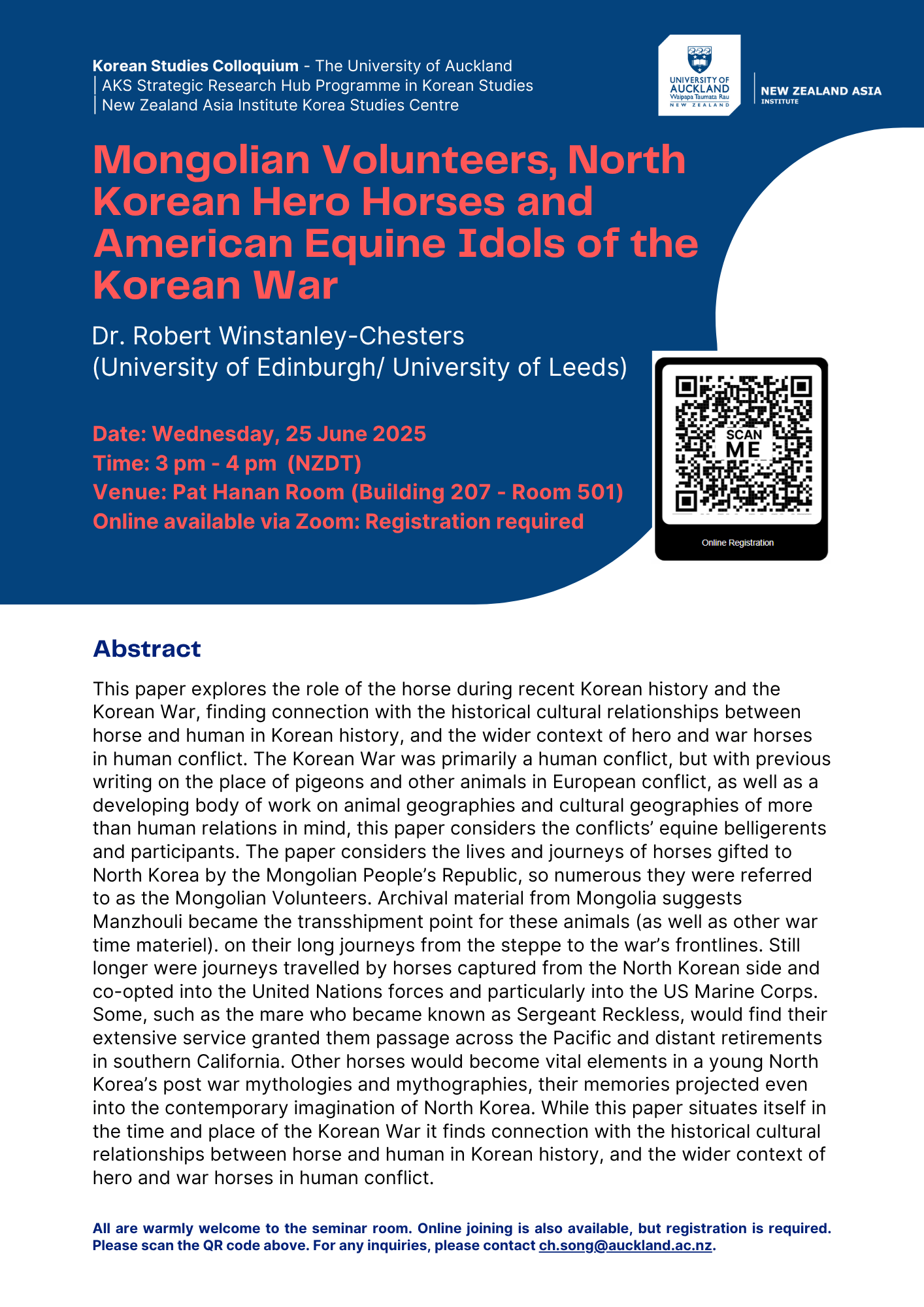time zone will be applied.
Report this post?

University of Auckland Korean Studies Colloquium Series titled: “Mongolian Volunteers, North Korean Hero Horses and American Equine Idols of the Korean War”
Join them as Dr. Robert Winstanley-Chesters (University of Edinburgh/University of Leeds) explores the remarkable roles of horses in recent Korean history and the Korean War, revealing how these animals became icons of heroism, memory, and cultural identity across North and South Korea, Mongolia, and the United States.
Event Details
This event is part of the University of Auckland’s Strategic Research Hub in Korean Studies, generously supported by the Academy of Korean Studies (AKS).
About the Talk
This paper explores the role of the horse during recent Korean history and the Korean War, finding connection with the historical cultural relationships between horse and human in Korean history, and the wider context of hero and war horses in human conflict. The Korean War was primarily a human conflict, but with previous writing on the place of pigeons and other animals in European conflict, as well as a developing body of work on animal geographies and cultural geographies of more than human relations in mind, this paper considers the conflicts’ equine belligerents and participants. The paper considers the lives and journeys of horses gifted to North Korea by the Mongolian People’s Republic, so numerous they were referred to as the Mongolian Volunteers. Archival material from Mongolia suggests Manzhouli became the transshipment point for these animals (as well as other war time materiel). on their long journeys from the steppe to the war’s frontlines. Still longer were journeys travelled by horses captured from the North Korean side and co-opted into the United Nations forces and particularly into the US Marine Corps. Some, such as the mare who became known as Sergeant Reckless, would find their extensive service granted them passage across the Pacific and distant retirements in southern California. Other horses would become vital elements in a young North Korea’s post war mythologies and mythographies, their memories projected even into the contemporary imagination of North Korea. While this paper situates itself in the time and place of the Korean War it finds connection with the historical cultural relationships between horse and human in Korean history, and the wider context of hero and war horses in human conflict.
Speaker Bio
Robert is an AKS Teaching and Research Fellow at the University of Edinburgh. Prior to this Robert worked as a Lecturer at York St John University, Bath Spa University, University of Leeds, Birkbeck, University of London, as a Research Fellow at Australian National University, and as a Post-Doctoral Fellow at the University of Cambridge. Robert obtained his PhD in Human Geography from the University of Leeds in 2008/2013 (his thesis is titled 'Ideology and the Production of Landscape in the Democratic People’s Republic of Korea.' Robert is the author of the monographs ‘Environment, Politics and Ideology in North Korea’ (Lexington, 2014), ‘Vibrant Matter(s): Fish, Fishing and Community in North Korea and Her Neighbours’ (Springer, 2020) and ‘New Goddess on Mt Paektu: Myth and Transformation in North Korean Landscape’ (Black Halo/Amazon KDP, 2020). Robert is currently researching North Korea necro-mobilities and other difficult or unwelcome bodies and materials in Korean/East Asian historical geography and the processes and landscapes of geographic knowledge production, fieldwork and theory during the Japanese Imperial and Korean colonial era, which is the subject of a forthcoming co-authored monograph for Amsterdam University Press.